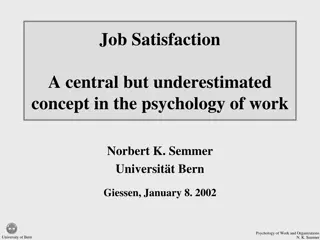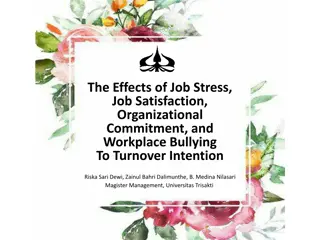Understanding Job Satisfaction in the Workplace
Job satisfaction is the degree to which employees feel content, motivated, and fulfilled in their roles. It encompasses factors such as job stability, career growth, work-life balance, and positive interactions within the organization. For employees, job satisfaction translates to a good salary, growth opportunities, and recognition, while employers benefit from increased productivity, loyalty, and reduced turnover. Factors influencing job satisfaction include salary, work environment, recognition, and opportunities for growth.
Download Presentation

Please find below an Image/Link to download the presentation.
The content on the website is provided AS IS for your information and personal use only. It may not be sold, licensed, or shared on other websites without obtaining consent from the author. Download presentation by click this link. If you encounter any issues during the download, it is possible that the publisher has removed the file from their server.
E N D
Presentation Transcript
Job Satisfaction Dr Digvijay Sharma School of Health Sciences
What is Job Satisfaction? Job satisfaction is defined as the extent to which an employee feels self-motivated, content & satisfied with his/her job. Job satisfaction happens when an employee feels he or she is having job stability, career growth and a comfortable work life balance. This implies that the employee is having satisfaction at job as the work meets the expectations of the individual.
Definition Job satisfaction is defined as the level of contentment employees feel with their job. This goes beyond their daily duties to cover satisfaction with team members/managers, satisfaction with organizational policies, and the impact of their job on employees personal lives.
Importance of Job Satisfaction A satisfied employee is always important for an organization as he/she aims to deliver the best of their capability. Every employee wants a strong career growth and work life balance at workplace. If an employee feels happy with their company & work, they look to give back to the company with all their efforts. Importance of job satisfaction can be seen from two perspectives:
For Employees Job satisfaction from an employee perspective is to earn a good gross salary, have job stability, have a steady career growth, get rewards & recognition and constantly have new opportunities.
For Employers For an employer, job satisfaction for an employee is an important aspect to get the best out of them. A satisfied employee always contributes more to the company, helps control attrition & helps the company grow. Employers needs to ensure a good job description to attract employees and constantly give opportunities to individuals to learn and grow. The positive effects of job satisfaction include: 1. More efficiency of employees of workplace if they are satisfied with their job. 2. Higher employee loyalty leading to more commitment. 3. Job satisfaction of employees eventually results in higher profits for companies. 4. High employee retention is possible if employees are happy.
Job Satisfaction Factors Job satisfaction is related to the psychology of an employee. A happy & content employee at a job is always motivated to contribute more. On the other hand, a dissatisfied employee is lethargic, makes mistakes & becomes a burden to the company. The elements & factors which contribute to job satisfaction are:
1. Compensation & Working conditions One of the biggest factors of job satisfaction are the compensation and benefits given to an employee. An employee with a good salary, incentives, bonuses, healthcare options etc. is happier with their job as compared to someone who doesn t have the same. A healthy workplace environment also adds value to an employee.
2. Work life balance Every individual wants to have a good workplace which allow them time to spend with their family & friends. Job satisfaction for employees is often due a good work life balance policy, which ensures that an employee spends quality time with their family along with doing their work. This improves the employee's quality of work life.
3. Respect & Recognition Any individual appreciates and feels motivated if they are respected at their workplace. Also, if they are awarded for their hard work, it further motivates employees. Hence recognition is one of the job satisfaction factors.
4. Job security If an employee is assured that the company would retain them even if the market is turbulent, it gives them immense confidence. Job security is one of the main reasons for job satisfaction for employees.
5. Challenges Monotonous work activities can lead to dissatisfied employees. Hence, things like job rotation, job enrichment etc can help in job satisfaction of employees as well.
6. Career Growth Employees always keep their career growth part as a high priority in their life. Hence, if a company helps groom employees and gives them newer job roles, it enhances the job satisfaction as they know they would get a boost in their career.
Theories of Job Satisfaction There are several theories given which help in evaluating & measuring job satisfaction of employees at workplace. Some of them are: - Hierarchy of Needs by Maslow - Hygiene Theory by Herzberg These help in understanding the parameters or factors which influence job satisfaction of employees at workplace.
Reasons Why Job Satisfaction Is so Important By actively working on satisfaction in the workplace, you end up with employees who are more engaged, involved, and eager to go the extra mile. This benefits your company in several ways.
1. Satisfied employees translate into satisfied customers If employees are unhappy at work, the chances are that this will reflect in their interactions with the customer. Contact centers, specifically, cannot afford to have dissatisfied employees this is sure to show in every word they say and every campaign they work on. Even in non-customer-facing jobs, low satisfaction can cause errors in the workflow for example, a higher defect rate in manufacturing and bad code in software development. This is why employee satisfaction is vital for customer-centric companies.
2. Voluntary turnover will come down Sometimes, turnover can be good for business, as it brings fresh talent into the organization. But voluntary turnover looks different you risk losing top talent you have carefully trained over the years. Also, this talent takes with it tribal knowledge once it leaves the company, which could toughen up the competition for your products and service offerings. On the other hand, a satisfied workforce is less likely to quit.
3. You increase the chances of referrals Employee referrals are the most effective method of recruitment, bar none. A report by Jobvite found that referrals make up 7% of all applications but an overwhelming 40% of all hires. An employee satisfied with the work conditions and the pay scale is far more likely to recommend their friends than a dissatisfied employee. Non-compensation related factors make up a big part of this benefit, as employees will assess multiple factors before recommending someone else.
4. Satisfaction is directly linked to your productivity In a positive work environment, employees are more likely to bring their best to work every day. For example, research by the Social Market Foundation and the University of Warwick s Centre for Competitive Advantage in the Global Economy (CAGE) found that happy employees are 20% more productive than unhappy employees on average! There s also a secondary reason for this high- satisfaction workplaces prioritize employee wellness. Therefore, they are more likely to look after themselves, and address stress/burnout/health issues, before it impacts work.
5. In the long term, you can dramatically reduce HR costs Typically, you need to plan for both fixed and variable costs as part of your HR budget. Low satisfaction could significantly dent the variable aspect of this equation dissatisfied employees require targeted surveys, specialized learning and development, additional career assistance, and ultimately may lead to rehiring and retraining costs in the case of turnover. All of this needs you to invest more than you had expected.
By making job satisfaction a priority at your company, you can stay ahead of the curve and ensure that there are no unprecedented issues arising due to low satisfaction. Driven by these benefits, more and more organizations are investing in job satisfaction initiatives. And this has had a marked impact on job satisfaction, as seen in the following statistics.
Measuring Job Satisfaction It is critical for any company to measure job satisfaction as the efficiency, productivity and loyalty of an employee depends on it. Companies can conduct surveys with questionnaires asking the employees about their feedback and understand if they are satisfied or dissatisfied with their job. Companies can ask the following questions to measure job satisfaction and can give multiple options like Satisfied, somewhat satisfied, neutral, somewhat dissatisfied, dissatisfied: 1. Are you happy with your salary/incentives? 2. Is your contribution to the company recognized with awards? 3. Do you find your workplace conditions good, hygienic, competitive? 4. Do you have a good work life balance? 5. Are you happy with company policies for your career growth & training and development? Apart from the above questions, specific open-ended questions about job satisfaction can also help in understanding employee pain-points and how the company can improve to ensure a happy employee. Hence, this concludes the definition of Job Satisfaction along with its overview.
Refrences https://www.mbaskool.com/business- concepts/human-resources-hr-terms/4394- job-satisfaction.html https://www.toolbox.com/hr/engagement- retention/articles/what-is-job-satisfaction/























